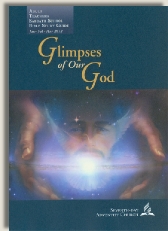|
||||||||||||||
Commentary on "Creation Care"
Day 3: Monday, February 20, 2012 - A Statement of Creation Care
Summary
In today’s lesson, the author presents the official SDA church statement on creation care that was released in 1995. The statement is reproduced below.
“Seventh day Adventists believe that humankind was created in the image of God, thus representing God as His stewards, to rule the natural environment in a faithful and fruitful way.
“Unfortunately, corruption and exploitation have been brought into the management of the human domain of responsibility. Increasingly men and women have been involved in a megalomaniacal destruction of the earth’s resources, resulting in widespread suffering, environmental disarray, and the threat of climate change. While scientific research needs to continue, it is clear from the accumulated evidence that the increasing emission of destructive gasses, the depletion of the protective mantle of ozone, the massive destruction of the American forests, and the so called greenhouse effect, are all threatening the earth’s ecosystem.
“These problems are largely due to human selfishness and the egocentric pursuit of getting more and more through ever increasing production, unlimited consumption and depletion of nonrenewable resources. The ecological crisis is rooted in humankind’s greed and refusal to practice good and faithful stewardship within the divine boundaries of creation.
“Seventh day Adventists advocate a simple, wholesome lifestyle, where people do not step on the treadmill of unbridled consumerism, goods getting, and production of waste. We call for respect of creation, restraint in the use of the world’s resources, reevaluation of one’s needs, and reaffirmation of the dignity of created life.”—Adventist Administrative Committee (ADCOM), released at General Conference session in Utrecht, the Netherlands, June 29–July 8, 1995.
Observations
Whereas many of these statements are technically true, the underlying assumption is that “if only” people were not so greedy, things would be different. “If only” we could just get back to honoring creation, life would be so much better. And then, the solution is offered: a 'simple, wholesome’ SDA lifestyle. Well, here is the problem: for individuals who live in developed parts of the world (e.g., western countries), the very fact that they exist means that they are using the world’s resources, and thereby (a) negatively impacting the environment in some way, (b) using resources that another (often more needy person) cannot use.
For instance, in 2004, the U.S. represented 5% of the world’s population, but consumed 33% of the world’s resources (source). Each baby born in the U.S. uses way more than his/her share of the world’s resources. The advent of agriculture has allowed the earth to feed more people; however, it is becoming clear that this state of affairs is unsustainable. Over the past few hundred years, extensive agriculture, aided by fertilizers derived from cheap fossil fuels, has led to biogenocide and displacement of animals from their natural habitats. (And this includes agriculture intended to produce corn and soybeans for people, not just animals. For more info, see this clip: The Vegetarian Myth.)
Thus, the situational complexities do not warrant simplistic solutions such as cutting back on consumption and waste and becoming vegetarians/vegans. Of course we should do what we can to avoid needless consumption. However, the real problems are systemic in nature and require much more drastic behavioral changes than even most SDAs would countenance. In order to reduce consumption and increase self-sustainability, are SDAs willing to get rid of their cars, move into a tiny shed in the country, grow most of their own food, and sew their own garments from wool they themselves spun? This lifestyle is either impossible or undesirable for most individuals. Yet this is exactly the lifestyle we all should be moving toward if we (in developing countries) really wish to curb our personal consumption levels and prepare for a sustainable future on this earth.
Another example is that there are millions orphaned children in the U.S. and around the world who, if not adopted, will be doomed to a life of prostitution, sex slavery, or death. Are SDAs willing to give up their rights to bear their own children in favor of adopting their children? How radical are they willing to get in order to put the systemic changes in motion? The evidence is strongly suggesting that behaviors such as (a) refraining from buying stuff one day out of each week or (b) choosing a soy burger over a beef burger, are not going to make a dent in the mammoth task ahead. In fact, the soy burgers are manufactured by giant companies, who have a monopoly on the world’s food supply, and are driving local farmers in developing countries off their land by selling corn and soy below market prices (For info. on the economic and ethical issues of the current food system, see this book: The Vegetarian Myth: Food, Justice, and Sustainability.)
The truth is that none of us really think that radically. We are all complicit in the destruction of the earth, and it’s not because we do bad things like eat lots of meat or have 20 pairs of shoes in our closets. We destroy the earth because we are born sinners and are trapped in a very broken system over which we have little control. Even the most devout Christians, who care deeply about the world God has made, are not willing/able to make the kinds of changes that are necessary to really make a difference as far as environmental/social concerns. Complicating the matter further, is the brightest minds among us cannot agree on exactly what those changes would be. Despite our best intentions, we really are doomed in every way: spiritually, physically (we are all going to die, if Jesus does not return first), and the whole creation is groaning with us. No, a 'simple/wholesome’ lifestyle is not going to save us, in any approximation, from the mess. This does not mean that we cannot follow the Holy Spirit in doing what we can to care for creation out of love for our neighbor (we all share this planet and its resources); but the truth of the matter is that we cannot/will not do what it takes. This is because of original sin (Ps. 51). Despite our best plans, we are all still fallen, depraved, and incapable of ultimately fixing any problem. Jesus is in charge of saving us and His world. It is not our responsibility to return this world to Eden. As mentioned earlier almost the whole book of Romans is devoted to what God did and only a few chapters give instructions for us. This is a good gauge for where the majority of our focus should be. If we keep centered on Jesus’ work, our future and the future of the rest of His creation will take care of itself.
Copyright 2012 BibleStudiesForAdventists.com. All rights reserved. Revised January 24, 2012. This website is published by Life Assurance Ministries, Glendale, Arizona, USA, the publisher of Proclamation! Magazine. Contact email: BibleStudiesForAdventists@gmail.com.
The Sabbath School Bible Study Guide and the corresponding E.G. White Notes are published by Pacific Press Publishing Association, which is owned and operated by the Seventh-day Adventist church. The current quarter's editions are pictured above.
Official Adventist Resources
Standard Edition Study Guide Week 8
Teacher's Edition Study Guide Week 8
Easy Reading Edition Study Guide Wk 8
Search the Complete Published Ellen G. White Writings
Please Support This Project


